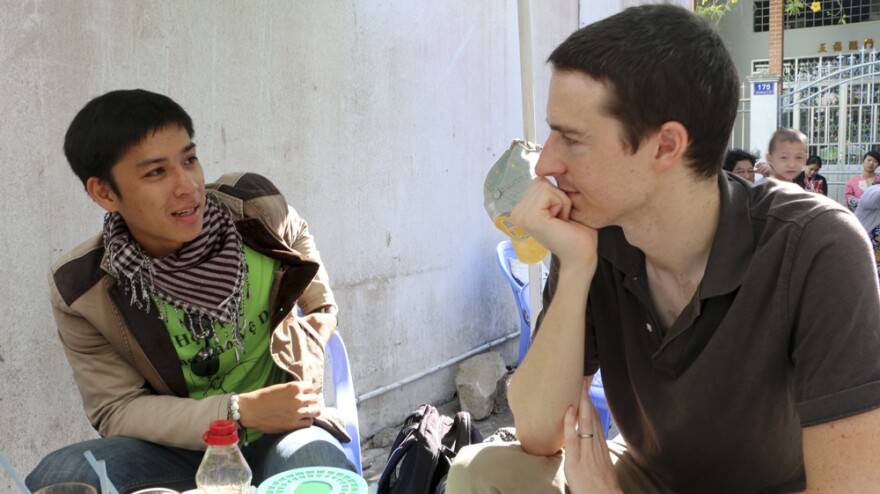Riding southwest from Saigon, the visible landscape of the Mekong delta appears immediately similar to the Mississippi delta. Green plants are everywhere, cut through with muddy water. Of course the tropical climate of Vietnam means there are coconut palms and other exotic plant life.
A major challenge of the working delta is controlling the mix of freshwater and saltwater, both on a wide scale and on an individual farm scale. The canals serve as dividing lines, as do a series of sluice gates.
From a canal, dug down into the delta from the river, locals may draw freshwater for growing rice, fruit and vegetables, and also catch freshwater fish. But increasingly locals may want saltwater for a relatively new and more lucrative enterprise: growing shrimp.
There is pressure in some freshwater areas to let saltwater in for aquaculture, but shrimp farming takes bigger investments, and once the land and water is salinated, it’s difficult — if not impossible — to go back to freshwater activities. It makes the switch a risk.

On the backs of motorbikes, we explore the area with our guides, Cornell University Ph.D. candidate Tim Gorman, in Vietnam doing research on water management, and his assistant Khiem Nguyen. First stop is a stunning Khmer Buddhist pagoda, dating back to the 1200s.

There, a local farmer chatting with friends agrees to show us his land — and feed us lunch. After sitting down to seafood soup and rice, he takes us to his lotus fields. The crop is grown in standing water, mostly for its roots. Behind the lotus, rice fields. He’s happy growing freshwater crops, he says, for the lower risk and the higher stability. His wife, a local government official, supplements the family’s income.


We then meet his neighbor, a woman who’s in the process of switching from growing rice to raising shrimp. Heavy machinery digs the ponds, which will be lined with thick plastic and have mechanical fans added to aerate the water. She’s close to a manmade freshwater canal she has used for rice. But she’s also close to a natural canal with brackish water, and will use that to fill the ponds, then stock them with shrimp.

Her primary reason for the switch? To pay for her children’s school expenses, she says. She tried growing rice and shrimp together, in rotation, as the government has suggested, but didn’t find it lucrative enough to continue.
Later in the day we reach a set of gates that would look familiar to south Louisiana residents.
These were built by the government more than a decade ago, to block saltwater coming up from the sea. On the other side of the gates, fishing boats dock to head out into open water for saltwater catch. On the protected side of the canals, farmers grow rice on either side. But some complain the gates don’t work, that saltwater creeps in — increasingly so with more tidal flooding.

Outside of gate protection, closer to the sea, you’d think the land would be less desirable, but the rise in shrimp farming has changed that. Mangrove forests are consistently being cleared to make way for private shrimp farms. When we saw the logo on this house, under construction, we had to stop.

Those are indeed shrimp at the top, plus the initials of the husband and wife, and a pot of gold between them, the wife tells us. Their home is being built in the middle of their shrimp empire, about 20 large ponds. The ponds need some tending, to feed the shrimp, but Tim Gorman tells us it’s not a labor intensive industry. These shrimp “millionaires,” as we started calling them among ourselves, are locals. But many are absentee shrimp farmers from the city.

Travelling on the next day into another province, we hear a great story about the freshwater versus saltwater debate. Down a narrow alley, we can get up close to one set of saltwater gates, built in the late 1990s, and heralded by the government as a way to promote rice production. The problem? People here wanted to grow shrimp. They staged protests, and at one point took their tools to try to dismantle or open the gates. Barred from that, they staked out the area for several days, day and night. This woman’s husband helped lead the protests, she said.

Eventually the government seemingly acquiesced, leaving the gates open most of the time — giving locals the chance to make more money growing shrimp, but sacrificing the more stable income and local food supply of rice crops. The woman who helped protest the gates has tried shrimp farming at least twice, and it hasn’t gone well for her, resulting in her family mortgaging its land.

Taking the motorbikes through more rural areas, we arrived at our final stop, the home of a young farmer eager to take over his parents’ rice fields and turn the area into his province’s first eco-farm. He’s studied water management and does research at the nearest university, two hours away. While many farmers’ children are moving away from the Mekong delta to Vietnam’s growing cities, he’s staying and taking a new approach to the land. And, thankfully, generously treating visitors to dinner.

Radio stories from our WWNO Mississippi-Mekong River delta project coming soon! Stay tuned to New Orleans Public Radio, as always, for all our Coastal Desk adventures.
Support for WWNO's Coastal Desk comes from the Walton Family Foundation, the Greater New Orleans Foundation, and the Kabacoff Family Foundation.



